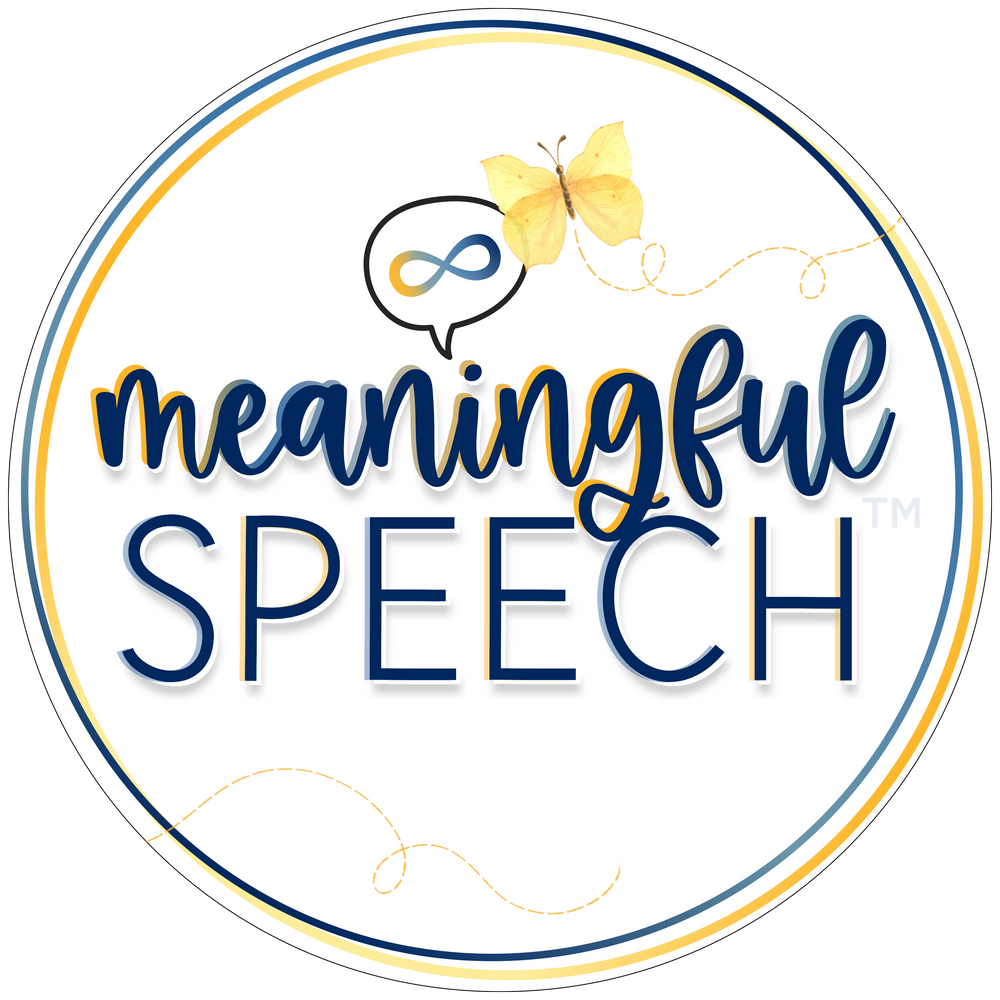Attention & AAC systems
Oct 18, 2023
We’ve teamed up with Laura Hayes, Meaningful Speech team member, AAC specialist and instructor of our AAC for Gestalt Language Processors course, to bring you important information during AAC awareness month about attention and AAC systems. We often hear from professionals and parents/caregivers that a child doesn’t seem to be attending to their AAC system when they’re modeling or when they’re using it because they’re not looking at the device when they model or when the child presses a button. Eye contact or looking at the device does not mean they’re uninterested or not attending to your modeling.
Just Because they Aren’t Looking Doesn’t Mean they are Not Interested
Research shows that autistic individuals respond to eye contact differently than allistic, non-autistic, individuals. They may find it difficult to focus on simultaneous spoken language and other visual input. This can include difficulty focusing on both communication partners and AAC systems. Eye contact can also be a very intense and overwhelming sensory experience. If an AAC user is not looking at the device, it does not mean they are not processing when you model. It also does not mean that it isn’t meaningful if they don’t look and touch a symbol/icon at the same time.
Instead of Forcing Eye Contact/Looking at the Device...
- Model language on the system/device in different contexts in the language stage the individual is in (based on language sampling). Presume the individual is listening.
- Offer wait time and silence to encourage return to the device and opportunities to communicate.
- Consider taking data on how they respond before, during, and after language models on the device. This can show they are responding and absorbing the language.
- Honor ALL communication forms (e.g., gestures, vocalizations) and acknowledge by affirming the message through models on the AAC system. (e.g., I hear you saying “let’s go.”)
Want to see AAC in action?
Here are some suggested resources and accounts to follow to learn more about AAC and gestalt language processors.
- Consider our AAC for Gestalt Language Processors course, taught by Meaningful Speech team member and AAC specialist Laura Hayes. It will teach you how to identify, evaluate and support gestalt language processors who use AAC or who you think might benefit from AAC.
- Consider following these accounts on Instagram. They often post examples of AAC in action:
Want to dive into the research behind this?
- Hirsch J, Zhang X, Noah JA, et al. Neural correlates of eye contact and social function in autism spectrum disorder. PLoS One. 2022; 17 (11): eo265798. doi: 10.1371/journal.pone.0265798
- Hirsch J, Zhang X, Noah JA, et al. Neural correlates of eye contact and social function in autism spectrum disorder. PLoS One. 2022; 17 (11): eo265798. doi: 10.1371/journal.pone.0265798
- Lauttia J, Hlminen TM, Leppanen JM, et al. Atypical pattern of frontal EEG asymmetry for direct gaze in young children with autism spectrum disorder. J Autism Dev Disord. 2019; 49 (9): 3592-3601. doi: 10.1007/s10803-019-04062-5
- Sennott, S.C., Light, J., & McNaughton, D. (2016). AAC modeling intervention research review. Research and Practice for Persons with Severe Disabilities, 41, 101–15
- Dada, S., & Alant, E. (2009). The effect of aided language stimulation on vocabulary acquisition in children with little or no functional speech. American Journal of Speech-Language Pathology, 18, 50–64.
Want to learn more in-depth information about how to support gestalt language processors?
1. There are many free podcasts, webinars and articles to get you started. A comprehensive list of resources can also be found on our website and Communication Development Center's website.
2. Consider taking the Meaningful Speech course to learn more about how your child or client processes language, how you can help support them from echolalia to self-generated (original flexible) language, child-led therapy, and neurodiversity-affirming practices. Looking for something shorter? We have a 1-hour introductory course perfect for extended family, daycare or school staff.
3. Consider taking our AAC + Gestalt Language Processing course. It will teach you how to identify, evaluate and support gestalt language processors who use AAC or who you think might benefit from AAC.
4. Look for a speech-language pathologist (SLP) who "gets it" and can help you in supporting your child's language development. Check out our registry for SLPs who understand gestalt language processing and child-led therapy.
5. Are you a school-based or private practice clinician looking for intake forms for new clients/students or creative visual reminder posters for your space? Check out the Meaningful Speech Marketplace.
